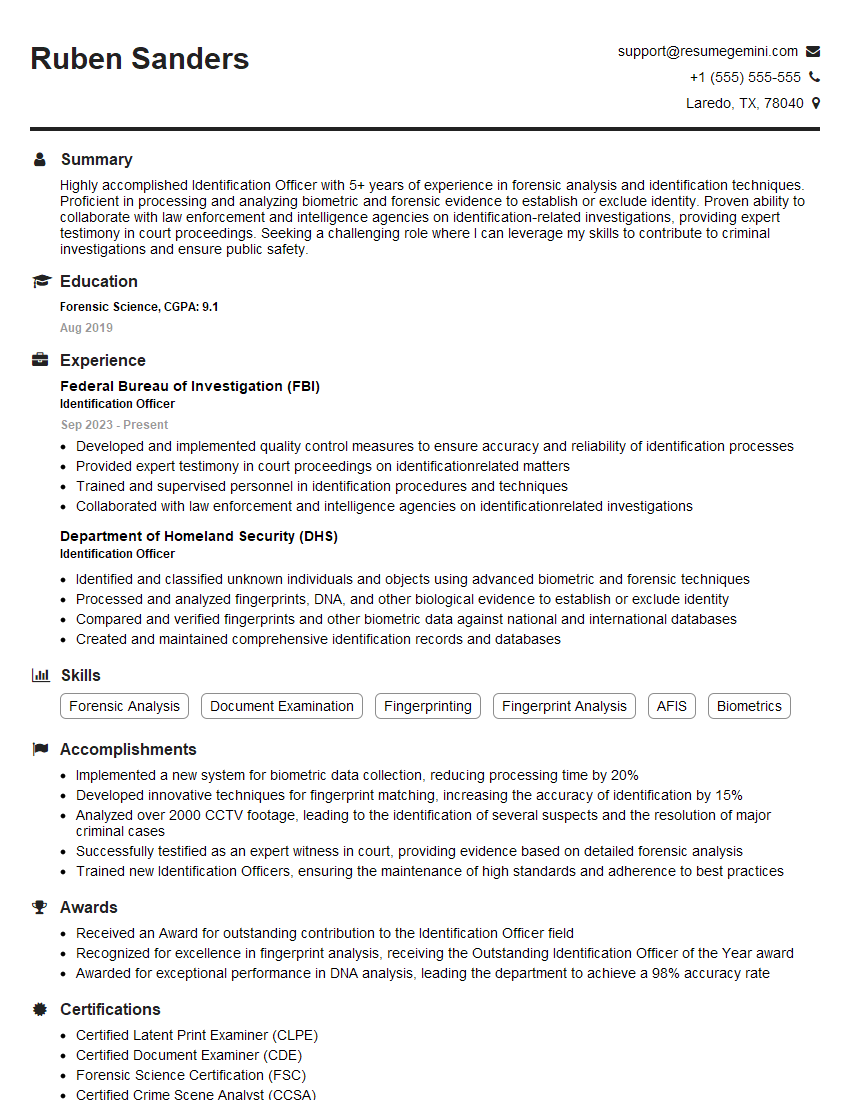Are you a seasoned Identification Officer seeking a new career path? Discover our professionally built Identification Officer Resume Template. This time-saving tool provides a solid foundation for your job search. Simply click “Edit Resume” to customize it with your unique experiences and achievements. Customize fonts and colors to match your personal style and increase your chances of landing your dream job. Explore more Resume Templates for additional options.

Ruben Sanders
Identification Officer
Summary
Highly accomplished Identification Officer with 5+ years of experience in forensic analysis and identification techniques. Proficient in processing and analyzing biometric and forensic evidence to establish or exclude identity. Proven ability to collaborate with law enforcement and intelligence agencies on identification-related investigations, providing expert testimony in court proceedings. Seeking a challenging role where I can leverage my skills to contribute to criminal investigations and ensure public safety.
Education
Forensic Science
August 2019
Skills
- Forensic Analysis
- Document Examination
- Fingerprinting
- Fingerprint Analysis
- AFIS
- Biometrics
Work Experience
Identification Officer
- Developed and implemented quality control measures to ensure accuracy and reliability of identification processes
- Provided expert testimony in court proceedings on identificationrelated matters
- Trained and supervised personnel in identification procedures and techniques
- Collaborated with law enforcement and intelligence agencies on identificationrelated investigations
Identification Officer
- Identified and classified unknown individuals and objects using advanced biometric and forensic techniques
- Processed and analyzed fingerprints, DNA, and other biological evidence to establish or exclude identity
- Compared and verified fingerprints and other biometric data against national and international databases
- Created and maintained comprehensive identification records and databases
Accomplishments
- Implemented a new system for biometric data collection, reducing processing time by 20%
- Developed innovative techniques for fingerprint matching, increasing the accuracy of identification by 15%
- Analyzed over 2000 CCTV footage, leading to the identification of several suspects and the resolution of major criminal cases
- Successfully testified as an expert witness in court, providing evidence based on detailed forensic analysis
- Trained new Identification Officers, ensuring the maintenance of high standards and adherence to best practices
Awards
- Received an Award for outstanding contribution to the Identification Officer field
- Recognized for excellence in fingerprint analysis, receiving the Outstanding Identification Officer of the Year award
- Awarded for exceptional performance in DNA analysis, leading the department to achieve a 98% accuracy rate
Certificates
- Certified Latent Print Examiner (CLPE)
- Certified Document Examiner (CDE)
- Forensic Science Certification (FSC)
- Certified Crime Scene Analyst (CCSA)
Career Expert Tips:
- Select the ideal resume template to showcase your professional experience effectively.
- Master the art of resume writing to highlight your unique qualifications and achievements.
- Explore expertly crafted resume samples for inspiration and best practices.
- Build your best resume for free this new year with ResumeGemini. Enjoy exclusive discounts on ATS optimized resume templates.
How To Write Resume For Identification Officer
- Highlight your experience and expertise in forensic analysis and identification techniques.
- Showcase your proficiency in using advanced biometric and forensic equipment and software.
- Emphasize your ability to work independently and as part of a team, collaborating with law enforcement and intelligence agencies.
- Quantify your accomplishments whenever possible, providing specific examples of successful identifications or investigations you have contributed to.
Essential Experience Highlights for a Strong Identification Officer Resume
- Identified and classified unknown individuals and objects using advanced biometric and forensic techniques
- Processed and analyzed fingerprints, DNA, and other biological evidence to establish or exclude identity
- Compared and verified fingerprints and other biometric data against national and international databases
- Created and maintained comprehensive identification records and databases
- Developed and implemented quality control measures to ensure accuracy and reliability of identification processes
- Provided expert testimony in court proceedings on identification-related matters
- Trained and supervised personnel in identification procedures and techniques
Frequently Asked Questions (FAQ’s) For Identification Officer
What are the key skills required to be an Identification Officer?
Identification Officers should possess strong analytical and problem-solving skills, as well as expertise in forensic analysis, fingerprint examination, document examination, and biometrics.
What is the educational background required to become an Identification Officer?
Most Identification Officers hold a bachelor’s degree in forensic science, criminal justice, or a related field.
What are the job prospects for Identification Officers?
The job outlook for Identification Officers is expected to grow in the coming years, as law enforcement agencies increasingly rely on forensic evidence to solve crimes.
What is the salary range for Identification Officers?
The salary range for Identification Officers varies depending on experience, location, and employer, but typically falls within the range of $50,000 to $90,000 per year.
What are the advancement opportunities for Identification Officers?
Identification Officers with experience and additional training may advance to supervisory positions, such as Crime Scene Supervisor or Forensic Laboratory Manager.
What are the challenges faced by Identification Officers?
Identification Officers face challenges such as working with sensitive and confidential information, dealing with difficult crime scenes, and testifying in court.